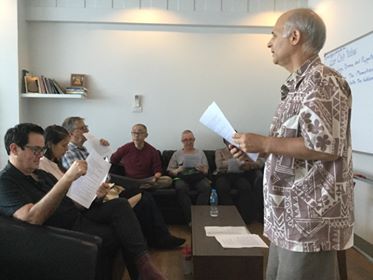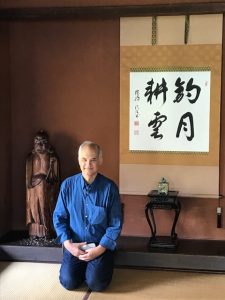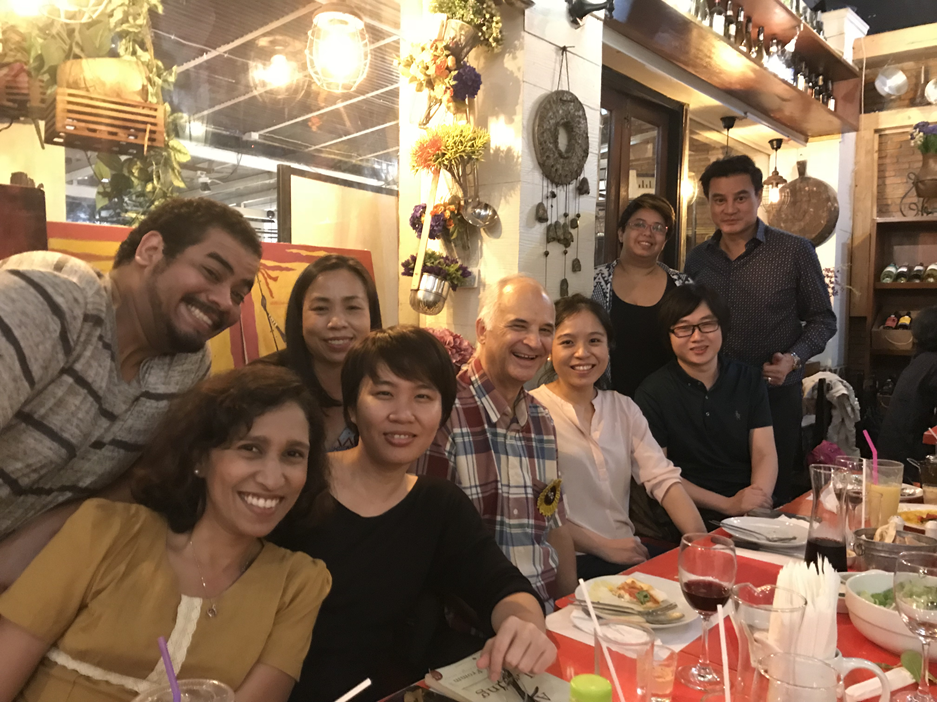
Reggie Pawle writes…
I have gone on a meandering path in life from where I grew up, which was in the rural state of Maine in the U.S.A. I was brought up to follow in my family tradition (seven generations before mine) of being a Protestant Christian minister, I was a religion major in university, but I took a turn of some kind during a LSD trip in 1970. Since that turn I have studied, lived, and worked where my interests have led me. At that time I was inspired by Ramdass, an American who practiced yoga in India, so in 1972 I went to India and Nepal to study yoga. In addition to having various yoga experiences, I also had many cultural experiences and got hooked on the combination of adventure, new cultures to understand, and spiritual seeking. In 1974, when I was having problems with yoga, Ramdass told me that my heart was ok, but my mind was a mess, and he recommended some good old Japanese discipline, so he introduced me to a Japanese Zen monk (Joshu Sasaki) from Myoshinji Temple in Kyoto. This began my connection to Kyoto and Japan. In 1987 I was refused a visa to India, which led me to travel in other countries in Asia, which I loved, and because I had run into a road block in my Zen practice, in 1989 I came to study Zen in Japan for the first time. I met my teacher, Sekkei Harada, in 1990, at Hosshinji Temple in Obama-shi, Fukui-ken, and after that I visited Japan annually to practice Zen with Harada Roshi until I moved to Kyoto to live in 1999. My practical reason for this move was that I was working on my dissertation, which was interviewing six Japanese Zen monks about Zen and psychology. I found a home in Kyoto. Along with being able to deepen my Zen practice, my time spent at the monastery opened many doors for me and gave me a huge access to the tradition of Zen. Thanks to my monastery “credentials,” despite my mediocre Japanese, I have always had access in Japan to my study and professional interests. I also in Kyoto had an endless variety of cultural experiences, met my Japanese wife (I got married for the first time at age 58), and received work in my field – both psychotherapy in private practice and teaching cross-cultural psychology at Kansai Gaidai University in Hirakata. Being in Japan also increased my access to other parts of Asia, which allowed me to develop a natural affinity that I felt between my Zen practice and Ramana Maharshi’s (Sri Ramanasramam, Tiruvannamalai, India) practice of “Who am I?”, study Daoism and Tai Chi in China, and enjoy travel in Southeast Asia. In 2015 due to mandatory age 65 retirement I lost my job at Kansai Gaidai, which resulted in getting a new job at Assumption University in Bangkok, Thailand, teaching counseling psychology to graduate students. I have returned to Kyoto after three years of my eyes being opened to a new culture, now half-retired, and very happy to be back in our wonderful Japanese-style house and Kyoto life. I am still working as a psychotherapist in private practice and as a student counselor at Kansai Gaidai, but no more teaching, only occasional seminars and lectures.

Since arriving in Japan I have written on a variety of subjects, mostly connected to cultural issues and to the integration of Western psychology with the Asian traditions, focusing on Zen, Japanese culture, and Daoism. Some of my articles have appeared in local publications such as Japanese Religions, Kyoto Journal, and Kansai Time Out. I have had a couple of book chapters, one on Zen and psychology and the second on Daoism and psychology, and some journal articles (see my blog for details). Now that I have more time, one of my main goals is to write. I have three projects that I am currently working on. One is a study of Japanese and Western marriages, one is the use of Daoist ideas and principles for conflict resolution, and the third is writing short articles for my blog on cultural and Buddhist psychology. I am hoping that Writers in Kyoto will serve as an inspiration and support for me to complete these and more writing projects. Writing a book seems like an ephemeral dream right now, but maybe some day…
For more about Reggie Pawle and his psychotherapy work, see www.reggiepawle.net

